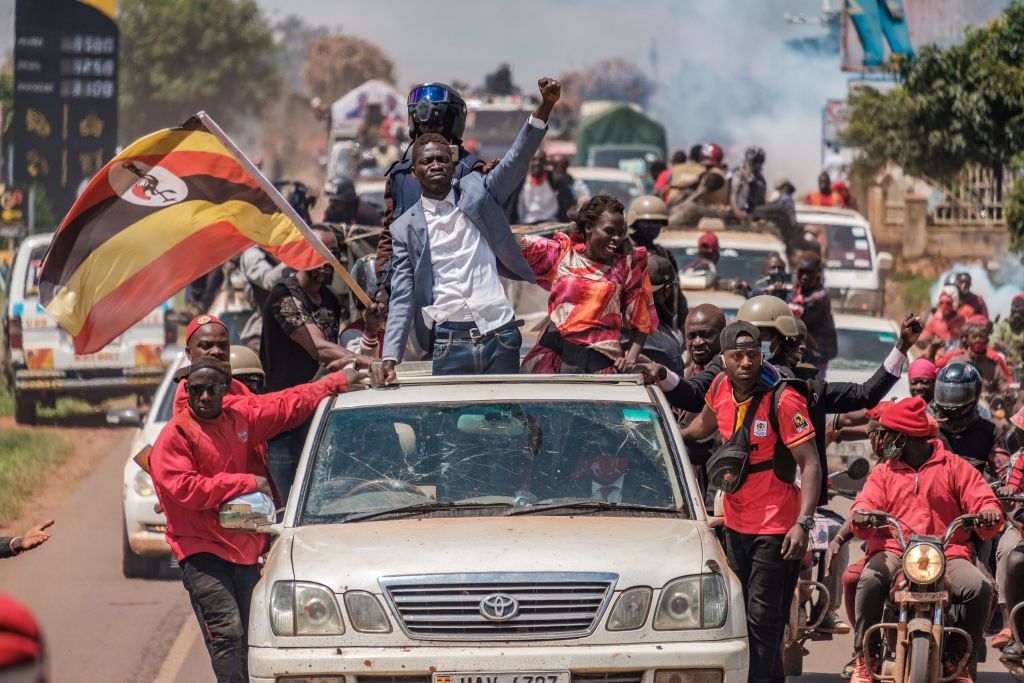
Uganda is heading to the polls today, after a heated campaign between the East African nation’s president, Yoweri Museveni (aged 76), and opposition frontrunner Robert Kyagulanyi (38), known more commonly by his stage name, Bobi Wine. It’s expected to be a
fiercely contested election, embodying, as the
Washington Post reported, ‘the most essential of democratic divides: change vs stability … the frustrated young vs the fearful old’.
The under-30s have power in numbers (two-thirds of registered voters in Uganda are in this cohort) and youthful innovation, but their elders have the power of an unchecked government behind them. Nowhere is this more evident than in the role technology and social media have played in the two candidates’ campaigns.
After Ugandan authorities prohibited in-person electioneering during the Covid-19 pandemic and blocked Wine from appearing on local TV, radio and billboards, he moved his campaign online. The recent
migration of many Ugandans to social media has, at least in part, been driven by Wine’s use of platforms such as Twitter and Facebook. His campaign messages, which already appealed to young voters, gained unprecedented traction when paired with their media of choice.
While reliance on social media as a primary source of information has its downsides, it has given Ugandans access to information and freedom of expression that is increasingly denied to them through traditional forms of media, which are largely controlled by the state.
Wine’s popularity as a presidential candidate is evident in the level of engagement his posts have received on Twitter and Facebook, which is considerably higher than his opponent’s. Museveni’s cause wasn’t helped by a recent
DFRLab investigation that exposed a network of pro-Museveni social media accounts that were exhibiting ‘coordinated inauthentic behaviour’ to amplify his online messaging.
Beyond campaigning, Wine has made it clear that he views smartphones, and technology more broadly, as a key means of countering electoral malpractice. On 3 January, his party, the National Unity Platform,
launched the UVote app and encouraged voters to download it and use it to log their votes. The aim is to compile a large, independent dataset that can be used to check against the Uganda Electoral Commission’s count. With no independent election observers confirmed for today’s election, the app is the party’s novel attempt to guard against the widespread voting irregularities and lack of oversight of the electoral commission
witnessed in the country’s 2016 poll.
In response to reports of international journalists being denied permission to cover the election, Wine has also urged voters to use their smartphones to film polling processes, including any cases of violence, to encourage compliance and ensure accountability.
Despite the innovative use of technology and social media by the opposition, power still firmly lies with the ruling party, as evidenced by the widespread internet shutdowns Uganda is currently facing.
There have been
reports in the lead-up to the election that the government has prevented the UVote app from being downloaded in Uganda. Wine’s party has urged people to use virtual private networks to get around the government’s restrictions, but the Uganda Communications Commission recently
ordered app stores to block access to more than 100 VPN apps.
Many voters will find ways around these measures. However, the issue remains that the UVote app’s effectiveness as an accountability measure is dependent on it having as many users as possible.
On 12 January, the communications commission
issued a letter to internet service providers ordering them to block all social media platforms and messaging apps ‘until further notice’. This is not the first time the Ugandan government has sought to block access to online platforms during an election. Votes on election day in 2016 were counted under a country-wide social media ban and internet blackout.
The Ugandan government has also demonstrated its ability to wield power over more than just internet service providers, as revealed by a
Wall Street Journal article on its use of spyware against Wine in 2019. In that effort it was reportedly assisted by Huawei.
Overall, though, Wine and his party have succeeded in using social media and technology to amass support and promote democratic values such as access to information. While it’s not yet clear whether this will secure real-life votes and accountability for this election, it has undoubtedly set in motion a path to democracy for young Ugandans.
 Print This Post
Print This Post